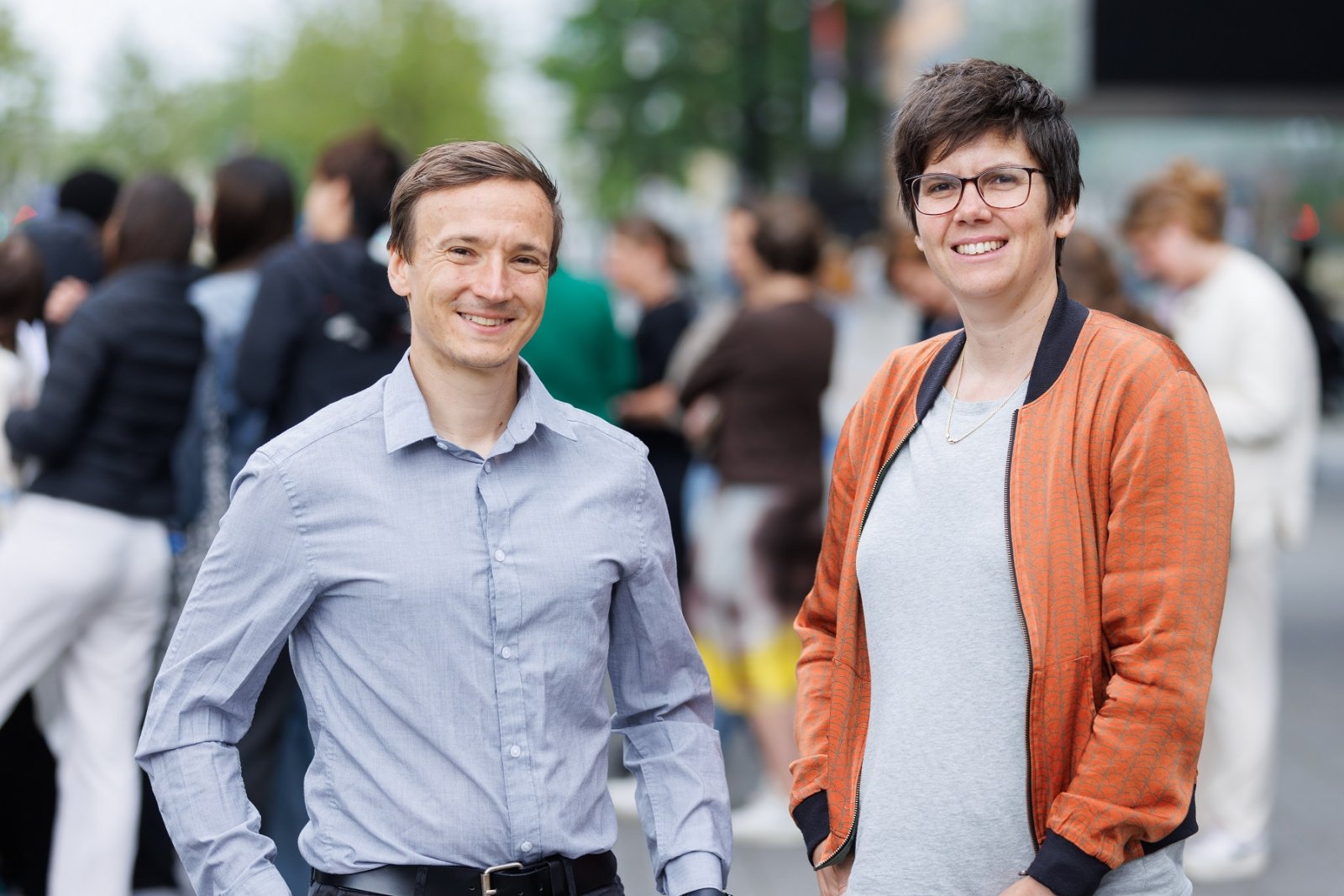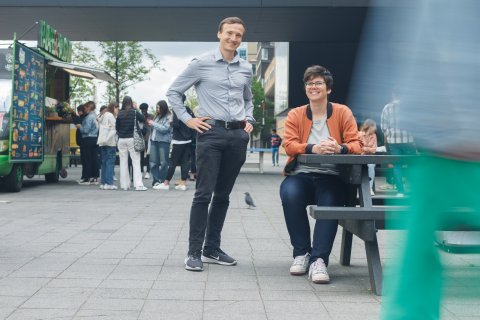Beyond the frenzy of the day
Stories from the Lab: AI & Media Lab
AI for journalists and avatars: at Utrecht University’s AI & Media Lab, researchers work on potential applications of Artificial Intelligence in the media world - and the virtual world. Julian Frommel and Karin van Es show what goes on behind the scenes.

Imagine: an algorithm that can recognise and moderate hate speech in the comments under an online news item, that can determine whether an article contains fake news, or that precisely customises the news to suit your specific interests.
The potential applications of Artificial Intelligence in the news world are enormous. But there are also dangers and pitfalls, such as privacy or security issues and a distortion of the news selection. How should a news organisation make the most efficient and convenient use of that, while also remaining ethical and responsible? At the AI & Media Lab, researchers from Utrecht University and Utrecht University of Applied Sciences, the Media Perspectives Foundation, and news and media organisations all work together to study these issues.
Game developers
But the AI & Media Lab is not only available to the journalist community. Assistant Professor Julian Frommel serves as the coordinator of the AI & Media Lab, and is specialised in games research. That world is also changing with the arrival of AI, and game developers come to the lab to gain insight into how they can make the most intelligent use of it.
“AI can make a big difference in both worlds”, says Frommel. “In journalism, AI can help with fact checking, discovery of newsworthy trends in large data sets, or by personalising the news selection. In the gaming industry - for example e-sports companies or serious gaming - AI can help make avatars more realistic or adjust the difficulty level to the player’s skills. Algorithms can also recognise and moderate inappropriate behaviour.”
You can use AI to send players faced with cyberbullying messages that help them deal with the negative experiences
Frommel gives an example from his own research at the juncture of human-computer interaction and AI. “We hope to start working in the lab on a long-term project on toxicity and harassment in game environments”, Frommel explains. “There is a widespread consensus in the game world that harmful behaviour and hate speech should not be accepted, but it still remains a major problem. We aim to use AI to develop a method to predict whether social interactions are positive or negative, and to adapt to that.”
Frommel’s team does so by training the computer to recognise inappropriate behaviour, such as cursing, hate speech or cyberbullying. “Automated algorithms can be trained to recognise certain patterns or characteristics of irritating messages, so that they can be identified quickly and deleted. You can also use AI to send players faced with cyberbullying messages that help them deal with the negative experiences.”
AI analyses public debate
In the lab, Frommel collaborates with Karin van Es, Associate Professor of Media and Culture Studies and Humanities project leader at the Data School. This research platform studies how the growing use of algorithms and large quantities of data can change democracy. For example, the Data School has developed The Ethical Data Assistant (DEDA), a tool for governments to identify ethical issues in data projects and bring them up for discussion. The platform is specialised in analysing (online) public debates, such as those about COVID-19 or the farmers’ protests on Twitter, Facebook and other media platforms.
Day-to-day experience offers more realism for utopian solutions
“Media organisations are often so focused on the latest news and fads that they don’t have time to work on other important issues for their operations. But they are interested in them, and in our expertise. With the Data School, we can help them with analyses, impact assessments, training, etcetera. The lab is more focused on long-term partnerships, so we can realise the right interdisciplinary collaborations to complete the projects.”
Earning a PhD at De Groene Amsterdammer
Joris Veerbeek, one of the PhD candidates at the AI & Media Lab, shows how that works. Van Es: “Joris’ PhD position is financed in part by the magazine De Groene Amsterdammer. Joris develops AI technologies that are relevant for journalists, and for his dissertation he’s studying how editorial boards deal with those technologies and other forms of Artificial Intelligence.”
Last year, Veerbeek joined with journalists from De Groene Amsterdammer in using AI to study hundreds of thousands of tweets that were sent to all of the women up for election in the Netherlands that year. The text analysis showed that female politicians have to deal with sexism and misogyny on a daily basis. As a result, women are more hesitant to choose for a career in politics, which is harmful for democracy. The article won a prestigious journalistic award, de Tegel (The Tile). Van Es: “More recent research studied which data sets were used to train chat bots. As a result of that research, questions were immediately asked in parliament about prohibiting ChatGPT due to privacy concerns.”

According to Van Es, Veerbeek’s research clearly shows how the interaction between science and society can help both get ahead. “For the scientific community, the experience of day-to-day work adds a dose of realism to utopian solutions, while external parties can benefit from the innovation and critical questions offered by scientists.”
The Associate Professor therefore hopes that the lab will be able to expand its network over the next few years, and build more durable relationships with news and media organisations. “Recent changes in society due to ‘data-fication’ and AI present a huge number of opportunities, but there’s also a dark side. At the lab, we have a place to bring different fields of expertise together and to join with the media industry and other parties to look for ways to deal with these transformations in a responsible manner. The search for ways to apply critical comments to concrete opportunities for action is one of the challenges I appreciate most. Plus, I learn so much from the expertise available at the external partners.”
“Collaboration between different fields and long-term relationships both present huge benefits for both parties”, Frommel agrees. “Through our joint research, we can help minimise the negative effects for media users. I think it’s important for (online) experiences with media to be pleasant and positive, and our research can contribute to making that happen.”
Utrecht AI Labs
In the Utrecht AI Labs Utrecht University brings research and real-world practice together by collaborating intensively with the business community, the public sector and other partners. The work in the Labs is a way to find responsible applications of AI, while training the AI talent of tomorrow.

